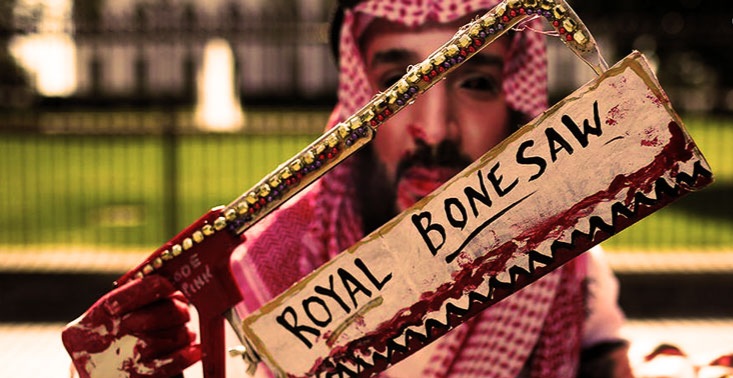Alwaght- With the acceleration of the economic and social reforms by Saudi Crown Prince Mohammed bin Salman, the political and security crackdown on the dissidents and criticism of the despotic rule of the ambitious prince has been tightening. In the latest case, a human rights organization reported that a Saudi court sentenced to death three men of Al-Huwaytat tribe for their rejection to relocate to free up land for Neom megaproject. This comes as the Saudi security apparatus in 2020 had killed another member of this tribe and kidnapped others for the same rejection.
In February 2020, Amnesty International in a revealing report talked about the Saudi government's move to establish a secret special court for cases related to the systematic suppression of human rights activists, writers, economists, journalists and any dissenting voice that defies the Bin Salman dictatorship and its actions.
The report suggested that Amnesty International spent five years investigating 95 cases that had been heard in this criminal court, which concluded that the court was routinely instrumentalized to silence criticism. The rights advocacy organization said that clerics, reformists, political activists, and especially Shiites were the main targets in this special court.
Bin Salman reforms’ bonds to repression and violence
Though bin Salman since the declaration of his reforms has tried to pave the way for his ascension of the throne and shine as a progressive and modernist leader seeking to change the world image of the Arab kingdom as a conservative, closed, and repressive regime, very soon and with the start of the detention of the dissidents and consequent assassination of the outspoken Washington Post journalist Jamal Khashoggi at the Saudi consulate in Istanbul in October 2018, it became clear to all that even under his rule, there is no room for civil participation in the political process and coercive dealing with the critics elevated to new heights. Now the real goals of the political and social changes are obvious: Greater concentration of the government, removal of obstacles for desired political, social and economic changes, and consolidation of the ruling regime.
Actually, bin Salman's push to cut off from the politics the religious apparatus (Wahhabism), which has been a partner to the Saudi rule over the past century and granted it legitimacy, was not but more concentration of the power in the government hands.
Since the foundation of Saudi Arabia almost a century ago, Wahhabi interpretations of Islamic texts and teachings— adopted by institutions such as the religious police, the ministry of education, and the Sharia-trained judiciary— have confirmed and enforced the general authority of government and in fact granted the Saudi government a character with religious legitimacy. But now that with Bin Salman's programs the country's government structures are being centralized, reshaped, and restrained, that religious doctrine is no longer committed to the teachings of Wahhabism and requires a government-affiliated clerical institution. In other words, to help sell these changes to the Saudi society along with maintaining credibility and reducing tensions, the royal family has continued to use the support of figures within religious institutions who show allegiance to the new political vision— a vision whereby the government under the leadership of the monarchy, and not the religious apparatus, defines public order.
This approach, however, undermines one of the main legitimizing pillars of the Saudi monarchy over a century. Also, the redacted reforms of the government have failed to win full support of the political thinkers, activists, fundamental change-seekers and produce modern political institutions and processes like parliament, elections, and parties.
From this aspect, bin Salman has to crack down on a wide range of opposition from clerics and conservative societies to thinkers, transformationists, and his opposition in the royal family.
Closing eyes to human rights by ‘hush oil’
The West has always considerably turned a blind eye to the Saudi government human rights violations.
At the beginning of Bin Salman's inauguration as crown prince, Western media and politicians welcomed the rhetoric and social reform programs of the new Saudi ruler and praised him as a political champion of reform, and even ignored his actions including the continuation of crimes in Yemen, repression and execution of Shiites citizens, and arrest of prominent Muslim Brotherhood clerics like Salman al-Ouda. However, the heinous murder of Khashoggi by a hit squad apparently sent by Prince Mohammed and its widespread reflection at the international level turned the propaganda wave of Western media against Bin Salman, making the Western politicians break the silence and censure the kingdom's human rights status.
Although even during this time the Western criticism did not exceed verbal borders and did not lead to a punishment for bin Salman who ordered the murder and crackdowns, with the start of Ukraine war and energy crisis, the Western politicians even abandoned the verbal criticism of the king-in-waiting and totally closed their eyes to the Saudi rights violations and even raced with each other for meeting him.
Today, even the West does not mention the tragedies the Saudis and Emiratis made in Yemen over the past eight years of war and even Riyadh’s violation of ceasefire commitments are backed by the UN, US, and Europe. While bewailing the death of civilians in Ukraine and backing the riots in the Axis of Resistance states, the West prefers silence to the Saudi war in Yemen and repression of opposition by bin Salman.



























